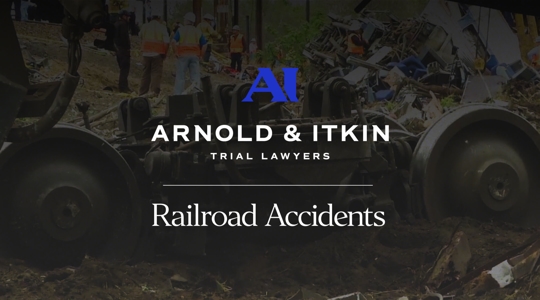Train Accidents Involving Cars & Pedestrians
Thousands of train accidents involve cars every year. These accidents result in significant injuries because of the massive size discrepancy between trains and vehicles. For example, a collision with a car can derail a train, causing it to collide with other vehicles on the road. Conductor negligence can also lead to train-car collisions. These accidents cause victims to suffer catastrophic injuries or wrongful death. Excessive cargo loads can also lead to derailment, and lack of maintenance can lead to a malfunction. Pedestrians involved in train accidents often suffer the most. They have little chance of survival against a train that is going full speed down the tracks.
Train-on-Train Collisions
Any train accident is likely to result in massive destruction, but when an accident involves two rail vehicles, the consequences will be even more destructive. These types of accidents are so tragic because trains have little time to slow down and nowhere to turn to avoid a collision. Add this to the massive weight and sheer force of each moving vehicle, and you have a disaster in the works.
Railway Accidents
Some train accidents occur because railway owners fail to warn passengers of potential hazards. It is their responsibility to ensure that every possible measure is taken to educate passengers and to ensure they secure rail yards, switching yards, rail right-of-way, train bridges, and other dangers on railroad property. It's also vital for railroads to clearly mark grade crossings. Many of the nation's train accidents occur at the same grade crossings every year. Why is that? Because the grade crossing either has an unsafe design or requires clearer markers—both of which are the railroad's responsibility. In cases of this kind, our New Mexico railroad accident lawyers seek answers and justice, with the goal of improving safety for others in the future.
Causes of Train Accidents in Albuquerque, NM
Investigations into train derailments across New Mexico, especially in metropolitan areas like Albuquerque, have revealed noteworthy insights. Predominantly, speed and human error emerge as the prime culprits behind such mishaps. Trains that cruise beyond 10 mph carry a higher risk of derailment. However, when the speed dips below that, human error becomes the dominant factor.
While each incident is different, the following are potential causes of railroad accidents:
- Damaged switches or out of adjustment
- Defective or mission crossties
- Failure to apply sufficient hand brakes
- Failure to comply with restricted speeds
- Failure to control shoving movement
- Switch points worn or broken
- Switches improperly lined
There are instances where trains collide with other vehicles, such as cars, at a rail intersection. Such a collision can jettison the train off its tracks, causing it to obliterate any obstacle in its trajectory. While some railroad crossings are tucked away in isolated areas, others are right in the heart of bustling zones like downtown Albuquerque. A train derailment in such urbanized settings poses the risk of crashing into edifices, potentially causing extensive human injuries and considerable economic repercussions.
Conductor Negligence as a Factor in Rail Accidents
In New Mexico, just as anywhere else, the onus of ensuring the safety of both the workers and the passengers aboard a train rests squarely on the conductor’s shoulders. A lapse in their vigilance or non-adherence to safety protocols can precipitate grave consequences. They must perpetually remain vigilant, promptly identifying any looming hazards and promptly communicating them to the entire crew. Any negligence in these responsibilities can have fatal outcomes.
A chilling example is the 2008 train mishap in Chatsworth, CA. The train overlooked an alert about an impending rail traffic hazard and collided head-on with a freight train, leading to the tragic demise of 25 individuals. The engineer, who was distracted by texting during the crucial moments, was identified as the liable party. Such incidents underscore why even the mere possession of a phone is proscribed for rail employees.
Conductors operating in New Mexico, especially high-traffic regions like Albuquerque, must stay abreast of all essential information. Any oversight or dereliction of duty doesn’t just jeopardize their own well-being; it imperils countless lives given that they’re in command of an enormous metallic behemoth hurtling forward at speeds often exceeding 50 mph.
Train Accident Attorneys in New Mexico
Time and time again, our Albuquerque train accident attorneys at Arnold & Itkin have witnessed companies do everything in their power to deny liability after an accident. Such cases can be complex and require extensive investigation. Survivors and grieving families need qualified attorneys to make sure the train company bears responsibility for their actions and that the victims are fairly compensated.
We know how difficult life becomes after an accident, so we are committed to helping our clients through it. If you were injured in a train accident, don’t hesitate to contact our New Mexico railroad accident attorneys. We can explain the different legal options available for your case and guide you through the process. We have recovered billions of dollars on behalf of our clients, helping them rebuild their lives.
Contact our New Mexico train accident lawyers today for a free case review: (888) 493-1629!
